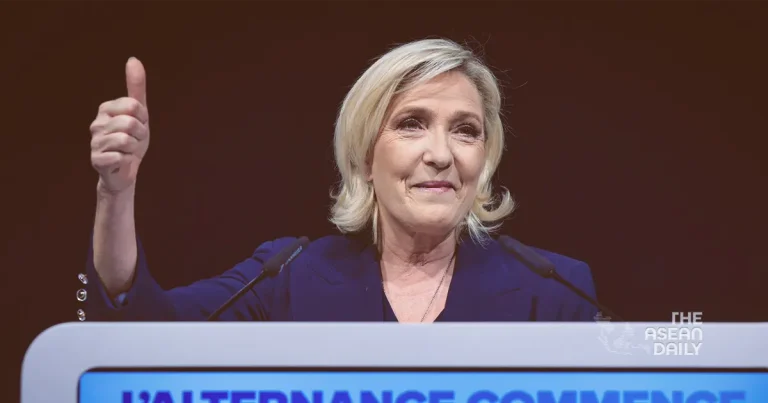1-7-2024 (PARIS) In a development that has sent shockwaves through France’s political landscape, Marine Le Pen’s far-right National Rally (RN) party emerged as the frontrunner in the first round of the country’s parliamentary elections, according to exit polls. However, the final outcome remains uncertain, hinging on days of intricate political maneuvering and horse-trading before next week’s decisive run-off.
Exit polls from esteemed pollsters Ipsos, Ifop, OpinionWay, and Elabe projected the RN to secure around 34 percent of the vote, surpassing leftist and centrist rivals, including President Emmanuel Macron’s Together alliance, which was estimated to garner between 20.5 and 23 percent of the vote. The hastily assembled left-wing coalition, the New Popular Front (NFP), is projected to secure approximately 29 percent of the vote.
While these exit polls aligned with pre-election opinion polls, they offered little clarity on whether the anti-immigrant, eurosceptic RN will be able to form a government to “cohabit” with the pro-EU Macron after the June 30 run-off. The RN’s chances of seizing power will depend heavily on the political bargaining and alliances forged by their rivals in the coming days.
Historically, centre-right and centre-left parties have united to keep the RN from power, a dynamic known as the “republican front.” However, this established practice is more uncertain than ever before, adding to the suspense surrounding the impending run-off.
According to French electoral rules, if no candidate secures 50 percent of the vote in the first round, the top two contenders automatically qualify for the second round, along with all those who garner 12.5 percent or more of registered voters. In the run-off, the candidate with the highest number of votes wins the constituency.
The high voter turnout on June 30 suggests that France is headed for a record number of three-way run-offs, a scenario that generally benefits the RN more than two-way contests, according to experts.
The horsetrading began almost immediately on June 30, with Macron issuing a written statement urging voters to rally behind candidates who are “clearly republican and democratic.” Based on his recent declarations, this call seemingly excludes candidates from the RN and the hard-left France Unbowed (LFI) party.
LFI leader Jean-Luc Melenchon, whose NFP alliance placed second, announced that the coalition would withdraw all its candidates who finished third in the first round. “Our guideline is simple and clear: not a single more vote for the National Rally,” he declared.
Jordan Bardella, the 28-year-old RN party president, expressed his readiness to assume the role of prime minister if his party secures an absolute majority. However, he ruled out attempting to form a minority government, and neither Macron nor the NFP have indicated a willingness to form an alliance with the RN.
“I will be a ‘cohabitation’ Prime Minister, respectful of the constitution and of the office of President of the Republic, but uncompromising about the policies we will implement,” Bardella stated.
While the RN was projected to win the most seats in the National Assembly, only one pollster – Elabe – predicted the party securing an absolute majority of 289 seats in the run-off. Experts caution that seat projections based on first-round votes can be highly inaccurate, particularly in this election.
The high voter turnout, reaching nearly 60 percent at 1500 GMT compared to 39.42 percent two years ago, underscored the intense political fervor ignited by Macron’s stunning decision to call a parliamentary vote after the RN trounced his party in the European Parliament elections earlier this month. This move plunged France into political uncertainty, sent shockwaves across Europe, and prompted a sell-off of French assets on financial markets.




